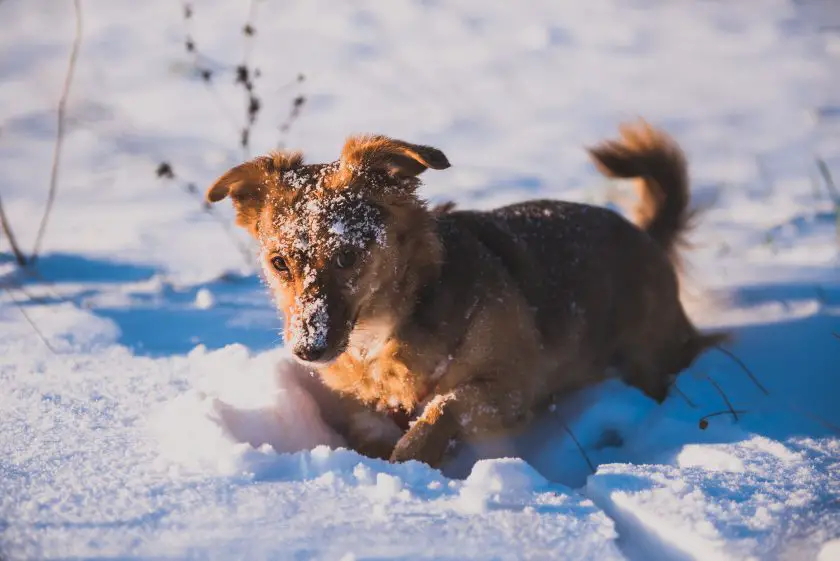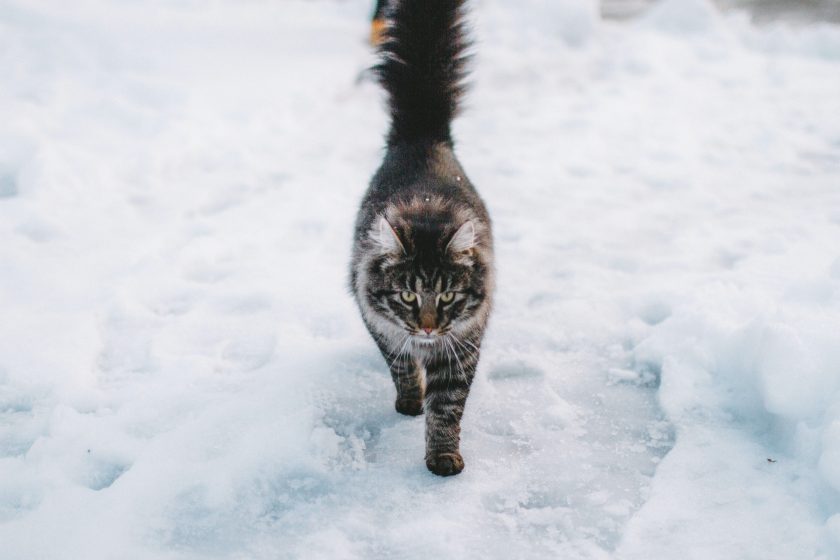Summer, the peak season for fleas and ticks. Not only we prepare for shedding, but we have to prepare for the insects and pests that sneak back into our homes using our pets as their ride to get there.
However, once summer ends, that’s it right? Wrong. Many people believe that once the warmer seasons are over, pesky little pests like fleas no longer survive and exist.
Here are pest control for your home that is safe for your pets ideas
This is in fact entirely hopeful but also incorrect. The truth is, fleas go on to live all year round, and during the colder months they need a warm place to live, making them even more desperate to find a host for them to latch on to.
In this article, I am going to not only tell you why your pets may have fleas in the winter, but I am also going to explain how you can continue to avoid fleas in the colder months, and what to do if you do find fleas on your pets in the winter.

Are fleas a problem in the winter?
Fleas can be a problem all year round. Unfortunately, they are not a seasonal pest. You may end up with fleas in your home or on your pets for a number of reasons during the winter.
Whilst spring and summer are a lot more vibrant for fleas, they do go on to survive in the colder months and so they often turn to animals in order to create somewhere warm and safe to set up camp.
It only takes one female flea to use your pet as a host, and before you know it she has laid her eggs, the eggs have hatched, and your pet has a flea infestation just before Christmas!
Not only may your pets pick up fleas from outside during colder months, but we are also a cause. If you have been around any other animals it may be the case that a flea has jumped from the animal to you, and you have worked as a ride for that flea to transfer onto your pets.
Whilst we view fleas as a dirty, unwanted pest, it is at nobody’s fault when fleas are transferred into different homes. In fact, it is incredibly easy for fleas to transfer from one body to the next using both humans and carpets and furniture and a mechanism to do so.
This is the case all year round, regardless of the weather.
How do you get rid of fleas in the winter?
If you do find yourself spotting fleas on your pet, or noticing an uncontrollable itch that they won’t get away from, there are some simple steps to solving this.
Getting rid of fleas is the same in the winter as it is in the summer.

For best results, contact your vet. They will prescribe the correct treatment depending on what kind of pet you have. It is important to follow this treatment step by step if you want to achieve the best results.
You should also continue to clean and vacuum up any areas your pet may have spent a lot of time, or particularly any areas where your pet may have been scratching. Fleas can drop off and continue to survive, and so even if you kill the fleas on your pet, it is important to also kill any others that may be surviving in the house.
You can also prevent fleas by following the above steps, but also by washing and grooming your pets when possible. If you do find yourself around other animals that appear to have fleas, make sure you wash your clothes to kill any that may have transferred onto you.
Can fleas bite in the winter?
Fleas will bite any time of the year. This is how fleas set up using your pet as a host. First they bite the animal to feed from the blood. They then go on to lay flea eggs.
Once their eggs have hatched, the fleas will multiply. This is why it is important to try and catch them as early as possible.
Flea bites are one of the easiest ways to identify if your pet has fleas. They will cause a lot of scratching, and will appear as little red bumps. They may also begin to scab over time.
Flea bites happen as the fleas feed. This then means that the fleas produce feces. This is known as flea dirt and appears as tiny black dots in your pet’s fur. You can identify this by combing your pet or bathing them. If the bath water turns a reddish color from the blood, this is an indication that flea dirt is present and if flea dirt is present, fleas are also present.
Do fleas die in the winter outside?
Many people believe fleas are not a problem in the winter because the harsh weather kills them. Unfortunately this is not the case. Whilst fleas need a host to survive, the weather has no impact on this.
Fleas will continue to find hosts regardless of the weather which is why they continue to be an annual problem and not a seasonal one.
Final Thoughts
As much as we would love fleas to die after summer, they continue to go on throughout winter.
Because of this, the best thing to do is take precaution. Continue to groom your pets and apply any flea sprays or collars that you usually use in the summer. Fleas can transfer to our pets in many ways, and this doesn’t stop once the weather gets colder.
If you do find yourself having to get rid of fleas, the best thing to do is to follow the regular process that you would follow any other time of the year. Contact your vet, get the correct treatment and follow this closely.
You can do a number of things to prevent your pets from catching fleas. Keep grooming them and keep your house nice and clean and this should help a lot.
If you do spot a flea, don’t worry too much. It is completely normal and you will be able to get rid of them as easily as you can in the summer!
FAQs
Yes, outdoor and indoor cats are at risk of fleas all year round.
Fleas will not die in the winter. Removing fleas from dogs is the same in winter as it is in summer, you will need to use a proper treatment.
Fleas live for the same lifespan in winter as they do in summer.
Fleas are a lot more common in spring and summer but they are around annually.
Fleas will not die at a particular temperature. Like anything, they can burn or freeze to death, but in terms of weather, very little will kill fleas and instead they will need to be killed using a flea treatment.

